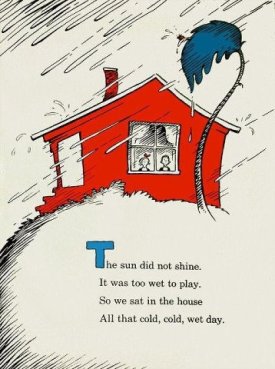Are you a fair weather writer?
 Thursday, January 17, 2013 at 6:30PM
Thursday, January 17, 2013 at 6:30PM 
Word count: 374 Read time: 1-2 minutes
The skies over Vancouver cleared last week and the rainforest deluge stopped. These sunny winter days are stunning but I miss the downpour that traps me inside. Dark wet weather is the perfect backdrop for my writing. Regardless, I work every day because, “A writer who waits for ideal conditions under which to work will die without putting a word on paper.” E.B. White
Today’s blinding sunshine didn't keep me from my novel even though I wanted to lace on my boots and hike through the forest. Instead I struck a compromise: once I’d broken through the rock wall in the plot in front of me - okay maybe chipped a little hole in it - I could go for a walk. But first I worked. "The fact is that writing is hard work, and sometimes you don't want to do it, and you can't think of what to write next, and you're fed up with the whole damn business. Of course there will be days when the stuff is not flowing freely. What you do then is MAKE IT UP. I like the reply of the composer Shostakovich to a student who complained that he couldn't find a theme for his second movement. 'Never mind the theme! Just write the movement!' he said." Philip Pullman
In our last seven weeks as residents of Australia, the LM and I toured our favourite spots, spending a few days here, a fortnight there, ten days with friends in the Hunter Valley. That was when I wrote my first YA novel. The weather was heavenly, the beaches were seductive and the wine flowed; it was Australia after all. Yet every day, no matter what distractions beckoned, I wrote for at least an hour. By the time we got on the plane to Canada, I had a viable first draft; it was that easy. Of course it would have been even easier not to have bothered but then I would only have had memories of those last weeks, not a SFD.
What propels you to stay on course with your project? When does the weather help you write and when does it offer a reason to play hooky? What deals do you make with yourself when temptation calls?


